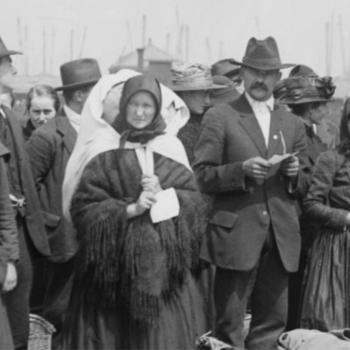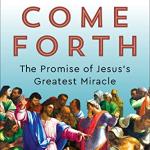
Not sure about you, but I am always curious as to how the letters of Paul were received by the people to whom they were written. Consider Paul’s letter to the Galatians. He calls them out, “You foolish Galatians, who has bewitched you” (Gal 3:1). I wonder what did they do with this? I suspect that many may have had a visceral reaction. After all, isn’t it human nature to react defensively when someone comes on this strong against us?
No prophet is welcome in his hometown
You might be familiar with Jesus’ words to the people of Nazareth, “No prophet is welcome in his hometown” (Luke 4:23).
What is often overlooked, however, is that Jesus says this even though the people of Nazareth were speaking “well of Him” (Luke 4:22). Luke seems to indicate that they were excited to know that Jesus was the Messiah! That is, they were welcoming Him.
NB: I know that you may not have read the account in Luke 4 this way but the text clearly says that when Jesus proclaimed, “Today this Scripture has been fulfilled in your hearing” (Luke 4:21), the people of Nazareth “were speaking well of Him, and wondering at the gracious words which were falling from His lips; and they were saying, ‘Is this not Joseph’s son?’” (Luke 4:22). In other words, after Jesus cites Isa 61 and claims that He is the One on whom the Spirit has been poured out—i.e., He is the long-awaited Messiah—the people were pleased and even surprised that it was “Joe’s kid.” “Who would have thought one of our own (Nazareth was a small, poor village. Hence, others wondered, “Can any good thing come out of Nazareth?”; John 1:46) would be the long-awaited Messiah.”
Why then did Jesus say, “No prophet is welcome in his hometown”?
Jesus says this, even though they welcomed Him because He knew that the message He was about to declare was not what they wanted to hear. He knew that they would soon reject Him.
But this seems to be true of most of the Scriptures. The writings of the prophets and most of the letters of the NT are words that the people didn’t want to hear: like the letter to the Galatians.
This is why I wonder how the letters of Paul were received by the churches.
Why do we love the prophets today?
I also wonder why the prophets are so well received today!
What do I mean? Well, if the words of the prophets got them imprisoned and sometimes killed (tradition says Isaiah was sawn in two and Jeremiah was stoned to death; the NT prophets didn’t fare any better: e.g., John the Baptist and Stephen, among others), then why are they so beloved in our churches today?
I suppose that we might suggest that they are well received today because we (unlike the original recipients) listen to the message of the prophets. We are on their side.
But are we?
NB: Now I am not denying that we listen to some of their messages. And I am not denying that we even want to listen to all of their messages.
I have noted before that I think it is dangerous for us to read the Scriptures and conclude that I am on Team Jesus, Team Paul, or Team Isaiah.
Now, let me be clear: I believe that it is a good thing that we desire to be on Team Jesus!
The great irony, however (and this is something that I will have to make the case for in upcoming posts), is that we seem to have a lot in common with the people to whom Isaiah, Jeremiah, and Ezekiel were rebuking.
The 7 churches of Revelation and the Western church today
It is my conviction that of the seven churches addressed in the book of Revelation, the Western church has far more in common with the church in Laodicea than that of Smyrna.
The church in Smyrna was poor and facing tribulation (Rev 2:9)—something that is rarely true of much of the Western church.
Whereas, the church in Laodicea declared, “I am rich, and have become wealthy, and have need of nothing” (Rev 3:17)—which sounds a lot more like many of our Western churches.
This, as I noted at the opening, makes me wonder, “How did those in Laodicea receive the book of Revelation?” I suspect that some (if not, many/most) did not like this message.
It seems, however, that most Christians today, though we disagree with what the text means, like the message of the book of Revelation. We also love Isaiah, Jeremiah, and Ezekiel.
Again, this is a bit puzzling. After all, Isaiah, Jeremiah, and Ezekiel have much to say that I don’t think we Western Christians enjoy hearing. For example, Ezekiel 16:15-52 is an extensive rebuke to the people of Israel that sounds very much like what a prophet might say to us in the Western church today.
Of course, we don’t seem to recognize its application because Ezekiel speaks about how they “played the harlot” (Ezek 16:15)—which doesn’t seem to impact us the way it might have impacted Ezekiel’s original audience. But the conclusion to the prophet’s rant appears very much to have relevance to today’s Western church (note I am going to quote a passage at length: make sure to observe the last verse):
Behold, everyone who quotes proverbs will quote this proverb concerning you, saying, ‘Like mother, like daughter.’
You are the daughter of your mother, who loathed her husband and children. You are also the sister of your sisters, who loathed their husbands and children. Your mother was a Hittite and your father an Amorite.
Now your older sister is Samaria, who lives north of you with her daughters; and your younger sister, who lives south of you, is Sodom with her daughters.
Yet you have not merely walked in their ways or done according to their abominations; but, as if that were too little, you acted more corruptly in all your conduct than they.
“As I live,” declares the Lord God, “Sodom, your sister and her daughters have not done as you and your daughters have done.
Behold, this was the guilt of your sister Sodom: she and her daughters had arrogance, abundant food and careless ease, but she did not help the poor and needy (Ezek 16:44-49).
Why I believe that the western church has largely fallen prey to the Beast
NB: I say “The Beast” here but I mean much more than this. One could include the Devil, the False Prophet, and Babylon.
For one, I believe that we have neglected a significant portion of the words of Jesus, the prophets, and the apostles. This is particularly evident in that “we are wealthy and comfortable and we neglect the poor and the needy.”
Second, we are not only wealthy but we justify our wealth as something we earned and deserve—and perhaps this is to some extent true. But we also condemn those who have nothing because of their laziness and sin.
Third, our condemnation of the poor for their laziness is often used as a justification for our lack of care for them: “After all, they will probably just misuse any aid we provide. They need to learn to pick themselves up like we did.”
Fourth, we have aligned ourselves, far more than we want to admit, with the Beast.
In upcoming posts, I will spell this out more clearly. For now, let me make the assertion: not only do we have “arrogance, abundant food, and careless ease,” and not only do we often neglect to help “the poor and needy,” but we have failed to recognize that our wealth and comfort has come at the expense of the poor and needy.
I am sure this claim will be met with much resistance. I ask, however, that you hear me out. After all, if I am correct, then we must lament and repent. And then we have many wrongs that we need to try and make right.
Where shall we go from here?
I recognize that I have not said enough to convince you that I am right. So, I would first exhort you to consider the possibility that my assessment is correct—even if I might be wrong in some of the details. Then, I exhort us to lament.
NB: I believe that the evangelical obsession with “self” too quickly runs to repentance. Repentance is good. But it needs to flow from a healthy lament. What does it mean to lament? To lament is to express deep sorrow at the state of affairs. To lament is to recognize the suffering and depravity that exists and to grieve over it. To lament entails an effort to see things from the perspective of the oppressed and to be deeply saddened by their reality.
. . . to be continued
Our goal is to keep these posts free of charge. I do not intend to ever hide them behind a paywall. I can only do this if those of you who have been blessed by them and can afford to give ($5, $10, $25, or more/month) do so. You can give a tax-deductible contribution by following this link.
Please share this post and let others know about determinetruth.
If you wish to view this blog on your smartphone through the Determinetruth app simply download the “tithe.ly church” app on your smartphone and insert “determinetruth” as the church name you wish to follow. Once it is loaded, simply click on the “blog” icon and it will automatically load.
If you would like to have Rob speak at your church or organization in person or via Zoom, please let us know by filling out the contact info on the Contact me tab on this site.
















